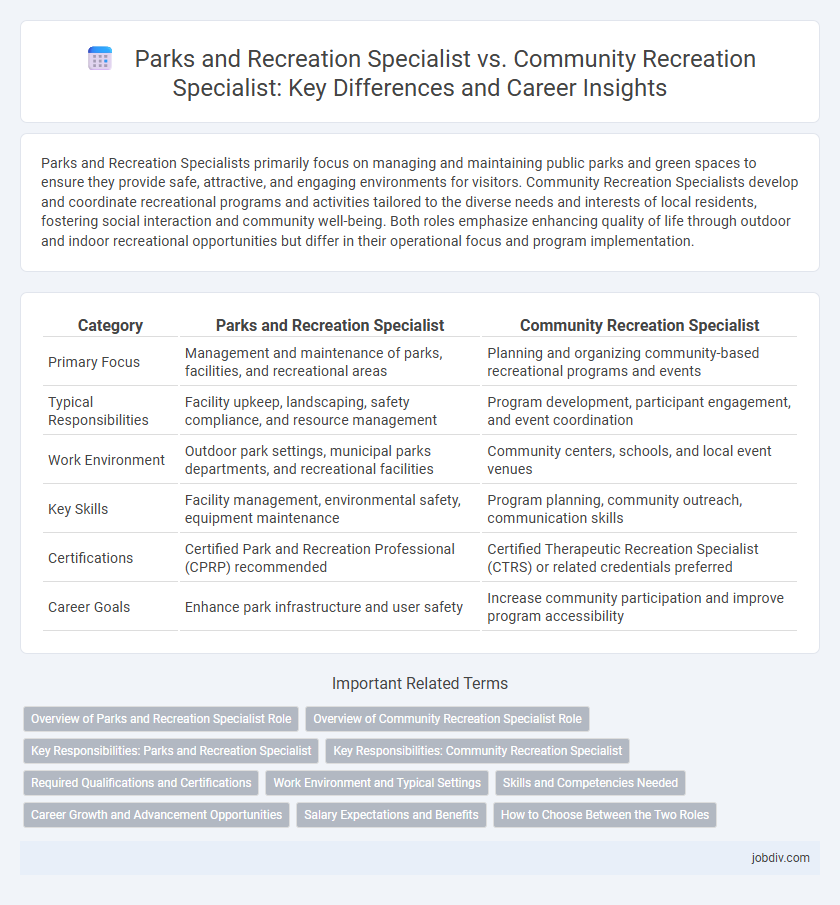Parks and Recreation Specialists primarily focus on managing and maintaining public parks and green spaces to ensure they provide safe, attractive, and engaging environments for visitors. Community Recreation Specialists develop and coordinate recreational programs and activities tailored to the diverse needs and interests of local residents, fostering social interaction and community well-being. Both roles emphasize enhancing quality of life through outdoor and indoor recreational opportunities but differ in their operational focus and program implementation.
Table of Comparison
| Category | Parks and Recreation Specialist | Community Recreation Specialist |
|---|---|---|
| Primary Focus | Management and maintenance of parks, facilities, and recreational areas | Planning and organizing community-based recreational programs and events |
| Typical Responsibilities | Facility upkeep, landscaping, safety compliance, and resource management | Program development, participant engagement, and event coordination |
| Work Environment | Outdoor park settings, municipal parks departments, and recreational facilities | Community centers, schools, and local event venues |
| Key Skills | Facility management, environmental safety, equipment maintenance | Program planning, community outreach, communication skills |
| Certifications | Certified Park and Recreation Professional (CPRP) recommended | Certified Therapeutic Recreation Specialist (CTRS) or related credentials preferred |
| Career Goals | Enhance park infrastructure and user safety | Increase community participation and improve program accessibility |
Overview of Parks and Recreation Specialist Role
Parks and Recreation Specialists manage the operation and maintenance of public parks, ensuring accessible green spaces and recreational facilities for community use. Their responsibilities include planning, organizing, and supervising leisure activities while promoting environmental stewardship and sustainability. Expertise in landscape management, facility coordination, and public safety standards is essential for optimizing recreational offerings and enhancing public engagement.
Overview of Community Recreation Specialist Role
Community Recreation Specialists design, implement, and evaluate programs that promote wellness and social engagement within local populations. They collaborate with community groups, manage recreational facilities, and organize events that meet diverse cultural and age needs. Their role emphasizes fostering inclusive environments to enhance quality of life through recreational activities.
Key Responsibilities: Parks and Recreation Specialist
Parks and Recreation Specialists manage public park facilities, ensuring maintenance, safety, and program development for outdoor activities. They coordinate community events, oversee recreational programming, and collaborate with local agencies to enhance park usage and environmental conservation. Their role emphasizes facility management, resource allocation, and promoting public access to recreational spaces.
Key Responsibilities: Community Recreation Specialist
Community Recreation Specialists design and implement programs that promote engagement, wellness, and cultural enrichment within diverse populations. They coordinate community events, manage facility operations, and collaborate with local organizations to enhance public participation. Their key responsibilities include assessing community needs, developing inclusive recreational activities, and ensuring safe, accessible environments for all participants.
Required Qualifications and Certifications
Parks and Recreation Specialists typically require a bachelor's degree in parks and recreation management, forestry, or a related field, along with certifications such as Certified Park and Recreation Professional (CPRP) from the National Recreation and Park Association (NRPA). Community Recreation Specialists often need similar educational backgrounds but may emphasize certifications in community wellness, program management, or specific therapeutic recreation credentials like Certified Therapeutic Recreation Specialist (CTRS). Both roles benefit from CPR and first aid certification to ensure safety during recreation program implementation.
Work Environment and Typical Settings
Parks and Recreation Specialists primarily work outdoors in public parks, nature reserves, and recreational facilities, managing natural resources and coordinating activities that promote environmental conservation. Community Recreation Specialists are often based in indoor or mixed settings such as community centers, schools, and urban recreational facilities, focusing on organizing social programs and events to enhance community engagement. Both roles require collaboration with local governments and community groups but differ in their environmental contexts and daily operational settings.
Skills and Competencies Needed
Parks and Recreation Specialists require expertise in landscape management, facility maintenance, and environmental sustainability to design and preserve outdoor recreational spaces. Community Recreation Specialists focus on program development, event coordination, and participant engagement skills to deliver effective community-centered recreational activities. Both roles demand strong interpersonal communication, organizational abilities, and knowledge of safety regulations to ensure inclusive and secure environments.
Career Growth and Advancement Opportunities
Parks and Recreation Specialists typically experience career growth through advancing to senior roles managing large park systems or specialized facilities, leveraging expertise in environmental stewardship and resource management. Community Recreation Specialists often progress by developing and overseeing diverse program portfolios, enhancing community engagement, and securing funding for public services. Both career paths offer advancement opportunities in leadership, program development, and public sector administration, with Parks Specialists emphasizing physical infrastructure and Community Specialists focusing on social programming impact.
Salary Expectations and Benefits
Parks and Recreation Specialists typically earn an average salary ranging from $40,000 to $60,000 annually, with benefits including health insurance, retirement plans, and paid leave, reflecting their focus on managing public parks and outdoor spaces. Community Recreation Specialists often command salaries between $35,000 and $55,000 per year, with comparable benefits packages emphasizing community program development and coordination. Both roles offer opportunities for advancement and specialized certifications that can enhance salary potential and job security within municipal or nonprofit sectors.
How to Choose Between the Two Roles
Choosing between a Parks and Recreation Specialist and a Community Recreation Specialist depends on your interest in managing physical outdoor spaces versus organizing community programs and events. Parks and Recreation Specialists focus on maintaining parks, green spaces, and recreational facilities, emphasizing environmental stewardship and facility upkeep. Community Recreation Specialists prioritize planning and implementing recreational activities, programs, and services that cater to diverse populations, enhancing community engagement and social wellbeing.
Parks and Recreation Specialist vs Community Recreation Specialist Infographic

 jobdiv.com
jobdiv.com